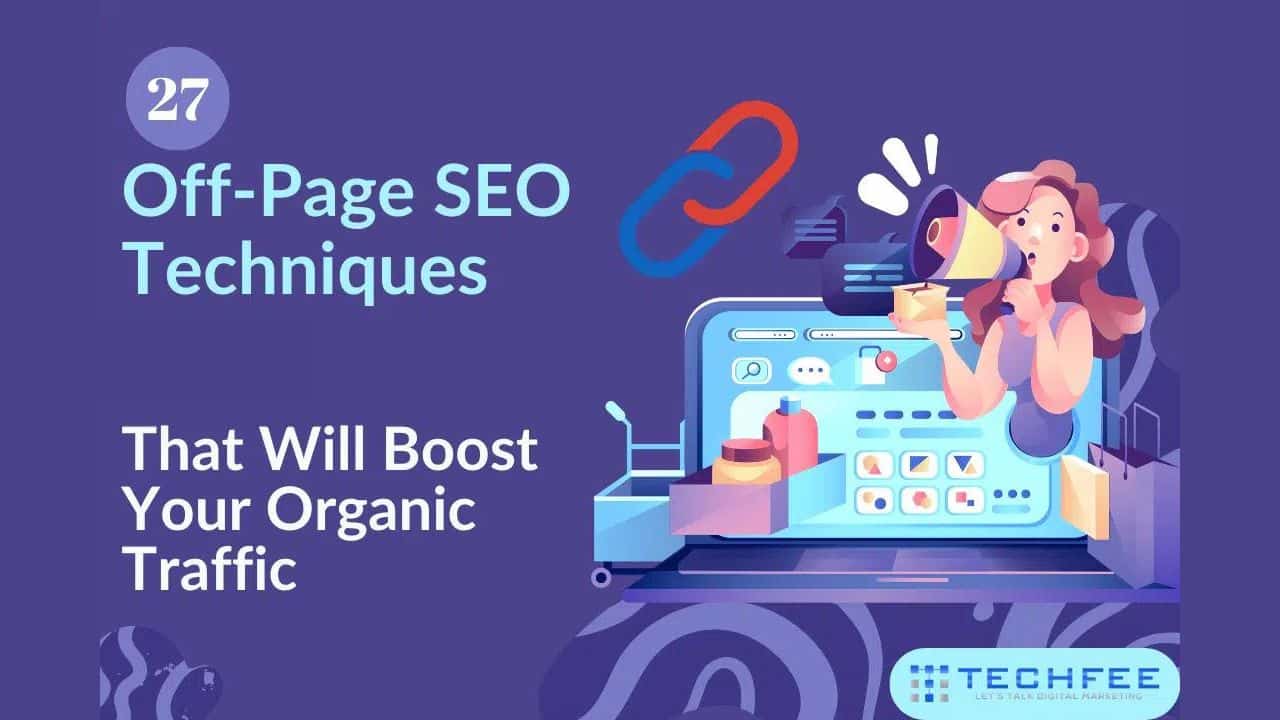When it comes to SEO off-page techniques, the sky is the limit. But if you want to stay forward of the curve in 2024, there are some of the best off-page SEO techniques 2024 that you should definitely be incorporating into your overall SEO plan.
As any SEO expert, I can tell you that off-page SEO is just as important as on-page SEO when boosting your organic traffic. But what exactly are off-page search engine optimizations? And how can you use them to their fullest potential in 2024?
One of the most proven off-page SEO techniques is link building. Link building involves creating high-quality backlinks to your website from other sites. This signals to Google that your website is authoritative and trustworthy, which can help grow your search engine ranking.
So if you are looking for ways to grow your organic traffic in 2024, you’re in luck! By implementing the best off-page SEO strategies and techniques outlined in this blog post, you can boost your organic traffic and improve your website’s ranking on search engines. So without any further delay, let’s get started!
What is off-page SEO?
Search engine optimization (SEO) is the process of improving the ranking of a website on search engine results pages (SERPs). There are two types of SEO: on-page SEO and off-page SEO. On-page SEO refers to optimizing a website’s content and code, while off-page SEO means promoting a website through link building and other off-page SEO activities.
What does off-page SEO include? It consists of all activities outside the website to promote it and improve its ranking. This includes link building and social media engagement to guest blogging and online PR.
By enhancing their off-page SEO, businesses can give their website a real boost in search engine rankings, which in turn will lead to more organic traffic.
Several off-page SEO factors can impact your website’s ranking on search engines.
- One of the most crucial off-page SEO is link building. Search engines view links as votes of confidence, so the more high-quality links you have pointing to your site, the better you get google’s attention.
- Social media can also be an influential off-page ranking factor. Search engines consider social signals when determining rankings, so it’s important to have a solid social media presence.
- Creating informative and shareable content is another excellent way to improve your off-page SEO. If people are engaging with your content, it will signal to search engines that your site is valuable and worth ranking highly.
- Finally, make sure your site is easy to navigate and index. If search engine bots can’t easily crawl and index your pages, your off-page SEO efforts will be zero.
By taking care of these off-page SEO tactics, you can help search engines and users navigate your site quickly and improve your website’s relevancy, authority, reputation, and trust.
Why is off-page SEO Important, and Why Does it Matter?
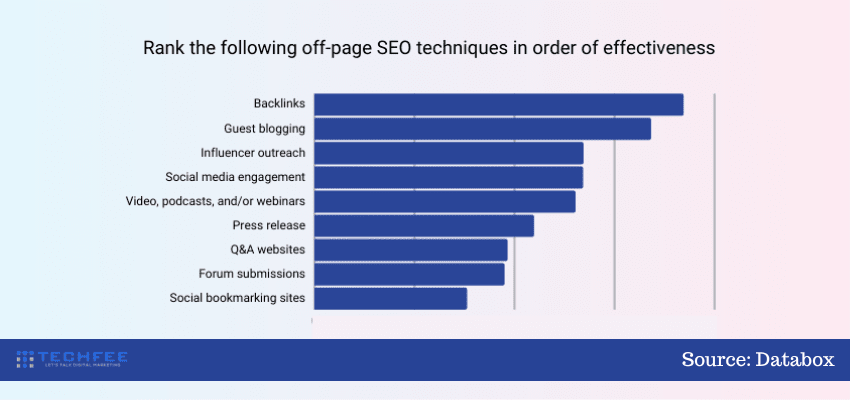
While on-page SEO is important for helping search engines understand what a website is about, off-page SEO is just as crucial for helping search engines understand the importance of a website.
It is essential because it helps to build credibility and authority for a website. When other websites link to your site, they consider it trustworthy and relevant. This, in turn, helps to improve your website’s ranking on SERPs.
While it may seem like off-page SEO is out of your hands, you can still do several things to improve it. And it matters because off-page SEO elements, including social media signals, brand mentions, and Guest Blogging, help to create a more well-rounded and trusted website, which Google and other search engines take into account when ranking websites.
For example, you can reach out to other websites in your niche and offer to guest blog for them. You can also post interesting and engaging content on your social media channels, which will encourage people to share your content and help build up your brand.
By implementing good off-page SEO strategies on your site, you can help to improve your website’s ranking in search results and get more traffic.
Off-page SEO Techniques 2024 You Must Know to Increase Rankings and Domain Authority
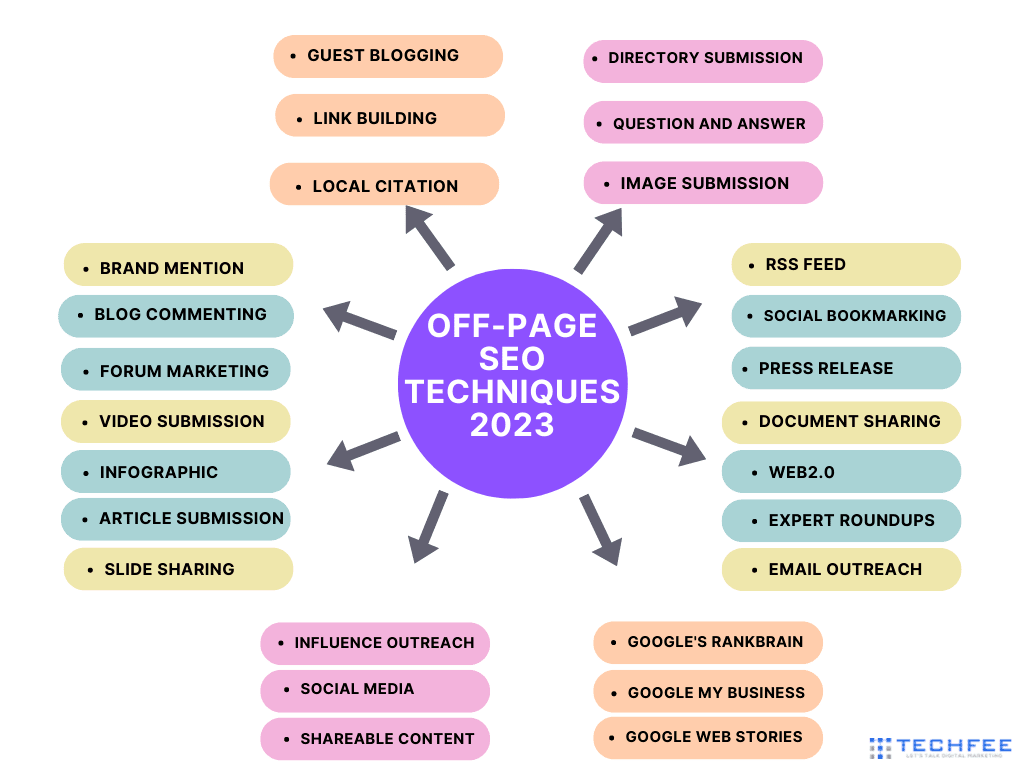
1. Optimize Your Website for Google's RankBrain Algorithm
One of the most important off-page SEO elements is optimizing your website for Google’s RankBrain algorithm. RankBrain is a machine learning system that helps Google interpret search queries and sort results.
While RankBrain is not a ranking factor, it influences how Google ranks websites. Although many businesses focus primarily on on-page SEO techniques to improve their ranking, optimizing for RankBrain can also significantly impact off-page SEO.
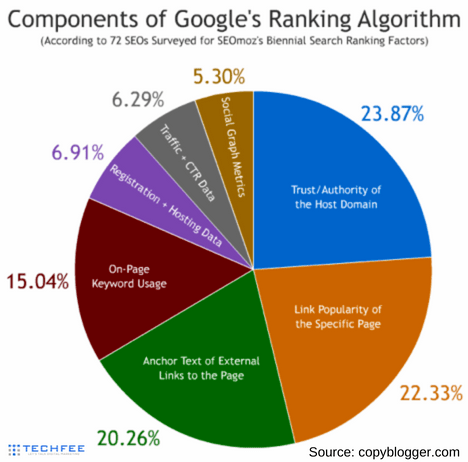
For example, if RankBrain sees many people clicking on a particular result, it will assume that the result is relevant and rank it higher. Conversely, if RankBrain sees that people are quickly bouncing from a result, it will take that the result is irrelevant and rank it lower. As such, it’s essential to ensure that your website is optimized for RankBrain. There are a few SEO tips you can use to help with this:
- Use keyword-rich titles and descriptions: One of the best ways to signal to Google that your website is relevant and informative is to use keyword-rich titles and descriptions. This helps RankBrain understand your website and match it with relevant searches.
- Structure your content: Another vital factor that RankBrain takes into account is how well-structured your content is. Clear headings, subheadings, bullet points, and short paragraphs make it easy for a brain to scan and understand your content, which can result in a higher ranking.
- Use images and videos: People are likelier to click on results that include images or videos. As such, including multimedia in your content can help to improve your ranking.
- Optimize your images and videos: In addition to text, RankBrain also pays attention to pictures on your website. Ensure to include keywords in your image file names and alt text to help Google understand what they’re about.
- Optimize your website for mobile: More and more people are using their smartphones to perform searches. As such, it’s essential to ensure that your site is mobile-friendly.
By following these checklists, you can ensure that your website is optimized for Google’s RankBrain algorithm – which can help improve your off-page SEO and search engine ranking.
2. Publish High-Quality Shareable Content
One of the most effective off-page SEO recommendations is to publish high-quality content that people will want to share. Content marketing can be a great way to attract links and social signals, which are essential for ranking well in search engines. Therefore, when creating content, focus on quality over quantity. This means creating articles, blog posts, infographics, videos, or other types of content that are shareable and that people will want to link to.
Content marketing is a powerful SEO off-page optimization technique that involves creating and sharing content on social media, in forums, on other websites, and anywhere else your target audience might be hanging out online.
By providing valuable, shareable content, you can earn links to your site (known as “backlinks”), which can help improve your site’s ranking in SERPs.
Therefore, Content marketing is an effective way to build relationships with potential and current customers, and it can also help you to earn links and improve your off-page SEO.
3. Social Media Engagement
Social media engagement is a beneficial platform to improve your site’s off-page SEO. By interacting with other users and sharing relevant content, you can help to build relationships, build backlinks, and drive more traffic to your site.
Social media can be primarily one of the powerful off-page SEO tools for small and medium businesses and startups who may not have the budget for traditional marketing campaigns. However, when used effectively, social media can be a cost-effective way to connect with potential prospects and expand your business.

As an off-page SEO technique, there are many options to use popular social media platforms, especially Facebook, Instagram, Twitter, and LinkedIn, so be sure to experiment profoundly and find what works best for you. Social media is a great tool to start if you want to generate more traffic and improve your off-page SEO.
4. Influencer Marketing (Influence Outreach)
Influencer marketing is building relationships with people who influence your target audience. These influencers can help promote your content and help it reach a larger audience. This can lead to more traffic and links to your site, which can help improve your SEO.
There are some different ways to find influencers to outreach to. One is to use a tool like Google Alerts to set up alerts for keywords related to your business or industry. This will help you track when influencers are talking about topics related to your business. You can also search social media profiles like Twitter and LinkedIn for influencers in your industry.
Once you’ve found some influencers, building relationships with them is essential. This can be done by sharing their content, commenting on their posts, and engaging with them on social media. As you build these relationships, you’ll likely get their support.
Influencer marketing can be an excellent way to improve your off-page SEO and generate traffic to your site.
5. Link Building
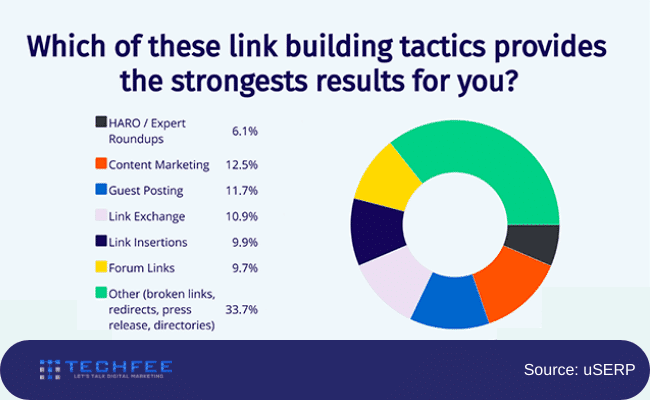
Link-building off-page SEO is acquiring backlinks from other websites to your own. It’s one of the most crucial SEO off-page activities and can be done in many ways. However, the most common method is to create link-worthy content.
This could be an informative blog post or an insightful industry report. Once you’ve created this content, you can contact other website owners and request them to link to it. Another way to build links is to participate in forums and online communities related to your industry.
By adding valuable comments and helpful advice, you can earn the trust of other members and eventually get them to link to your website.
You may also have heard the term “link bait.” It’s a piece of content specifically designed to generate incoming links from other websites. The goal of link bait is to improve a website’s search engine ranking by maximizing the number of inbound links. There are many different types of link bait, but some common examples include infographics, lists, quizzes, and controversial articles.
Link bait can effectively attract attention and boost traffic, but it’s important to remember that not all linvery k bait is created equal. To be successful, it must be well-written and relevant to your target audience. Otherwise, you risk turning off potential visitors and damaging your reputation.
The more backlinks you have, your site will rank in the search results. So when people see your link on another site, they’ll be more likely to click on it and visit your site. But do it properly with white hat techniques.
6. Local Citation
A local citation is an online mention of your business, typically on a directory or review site. These citations help improve your off-page SEO by signaling to search engines that your business is local and relevant. The more local authorities you have, the higher your chances of ranking in local search results.
A local citation can be as simple as your business name, address, and phone number (NAP) listed on a directory site like Yelp, Google My Business, Crunchbase, or Foursquare.
To get the most benefit from local citations, be sure to only list your business on high-quality sites relevant to your industry and constantly keep updating the profiles with the latest information about your business.
By taking the time to build local citations, you can give your business a boost in local search results and improve your off-page SEO.
7. Guest Blogging
Guest blogging is when you write a blog post for somebody else’s website. This is an excellent way to get your name and work out there and build relationships with other bloggers. When you guest blog, you typically include a link to your website. This helps to build high-quality backlinks, which are an important ranking factor for SEO.
In addition, guest blogging allows you to use keywords associated with your website. These keywords can help people find your site when they’re searching online. Guest blogging is one of the tremendous offsite SEO techniques to start off-page SEO and to get your work seen by more people.
8. Brand Mention
A brand mention is any time your brand is mentioned online, whether on a website, social media platform or even in an email. These brand mentions can help potential customers find you more efficiently, and they can also help to build trust and credibility for your brand.
Here’s how it works: Google’s algorithms are constantly crawling the web, looking for new content to index. So when they come across a brand mention, they’ll take note of it and add it to their database.
Over time, as more and more brand mentions are found, Google will start associating your brand with specific keywords. This will boost your rankings for those keywords, helping you improve your off-page SEO.
You can also use tools like Brandwatch, BrandMentions, Hootsuite, and Sprout Social to connect with the authors of that website who have mentioned your brand on their site and thank them for saying it and, at the same time, request them to make it a clickable link.
As anyone finds your brand name on any site, if the link is clickable, the visitor will come to your website directly. So this is another trending technique for off-page SEO optimization, and you can see a nice boost in your rankings over time.
9. Blog Commenting
Blog commenting is commenting on someone else’s blog post within your niche. This off-page SEO optimization can help maximize your site’s exposure in search engines by creating quality backlinks, increasing brand visibility, and generating traffic.
It also helps to make relationships with other bloggers, which can lead to guest posting opportunities and increased exposure for your blog.
Finally, blog comments can provide valuable feedback and insights on a post, which can help the author to improve their blog content. So, if you’re looking to improve your off-page SEO, blog commenting is a strategy you should consider.
10. Forum Marketing
By participating in forum discussions within your same business and adding value to the conversations, answering people’s questions, and giving suggestions and advice, forum users can build up their credibility and authority.
Forum marketing can also help to generate backlinks which are an essential factor in SEO. Overall, it is a valuable tool that can be used to boost the off-page SEO of a site.
Here are the top 5 forum submission sites:-
S No Forum Submission Sites DA PA
1 https://www.flickr.com/help/forum/en-us/ 92 72
2 https://www.addthis.com/forum 93 61
3 https://bbpress.org/forums/ 62 54
4 https://www.careerbuilder.com 84 69
5 https://www.chronicle.com/forums 82 53
11. Directory Submission
Directory submission is submitting your website’s or blog’s URL to an online directory. This helps to improve your site’s off-page SEO by increasing the number of backlinks pointing to your site and maximizes your search engine rankings and visibility.
While directory submission used to be a popular method of creating backlinks, it has declined in recent years due to the proliferation of spammy directories.
However, take the time to submit to high-quality, relevant directories and choose the appropriate category. It can still be a valuable tool for improving your site’s off-page SEO.
Here are the top 5 Directory Submission Sites for link building
S No Directory Submission Sites DA PA
1 https://industrydirectory.mjbizdaily.com/ 64 40
2 https://directory.entireweb.com/ 53 46
3 http://www.elecdir.com 36 49
4 https://www.sitepromotiondirectory.com/ 35 53
5 http://www.a1webdirectory.org/ 34 54
12. Question and Answer Sites
Most question-and-answer sites are free to use; anyone can sign up to ask or answer a question. By answering questions related to your website’s niche, you can help to build up your site’s reputation and authority.
In addition, linking to your website in your answers can help to drive traffic and improve your site’s search engine ranking. Finally, ensuring that your solutions are relevant and helpful is essential to avoid being marked as spam.
Trust me, if you have used this off-page SEO step correctly, question-and-answer sites can be a valuable tool for improving your off-page SEO.
Here are the top 5 Question and Answer Platforms for Creating Backlinks
S No Question and Answer Sites DA PA
1 https://www.quora.com/ 93 77
2 https://answers.yahoo.com/ 92 72
3 http://www.ehow.com/ 92 73
4 http://answerbag.com/ 65 51
5 http://www.blurtit.com/ 63 58
13. Image Submission
Search engines use various factors to determine the ranking of a website in their search results. One of these factors is the number of backlinks to a site. When you submit images to directories or image-sharing sites, you create quality backlinks to your website.
Submitting images to popular submission sites improves site traffic, increases brand awareness, and boosts your search engine rankings. But make sure before submitting your photos are well-optimized with proper Meta titles and descriptions and have the correct URL tag.
Here are 5 top Image Sharing Sites for link building
S No Image Submission Sites DA PA
1 https://www.mediafire.com/ 94 79
2 https://in.pinterest.com/ 94 82
3 https://instagram.com/ 93 100
4 https://www.flickr.com/ 92 95
5 https://imgur.com/ 92 82
14. Video Submission
Video submission is also a part of SEO strategies that helps increase brand exposure, improve engagement with your target audience, and increase search engine rankings.
In addition, video submission is also a great way to build relationships with other bloggers and web admins in your niche. It can also help to build brand awareness, generate backlinks, and drive traffic to your website. When done correctly, video submission can be an effective way to improve the off-page SEO of a website.
Top 5 Video Submission Sites
S No Video Submission Sites DA PA
1 https://www.youtube.com/ 99 100
2 https://vimeo.com/ 97 96
3 https://www.dailymotion.com/in 96 67
4 https://vine.co/ 90 71
5 https://www.metacafe.com/ 88 76
15. Infographic Submission
By doing this, you are creating backlinks to your site, which will help to improve its position in search engine rankings. Additionally, infographics tend to be shared more often than other types of content, which can also help increase your site’s traffic.
The best way to make an Infographic submission is to find high-quality websites related to your niche and submit your infographic to them. This will give you the most targeted traffic and the highest-quality backlinks.
Here are the top 5 Infographic Submission Sites for Link Building
S No Infographics Submission Sites DA PA
1 http://www.reddit.com/r/Infographics 91 69
2 http://visual.ly/ 78 70
3 http://www.infographicsarchive.com/ 55 52
4 http://submitinfographics.com/ 47 47
5 http://www.nerdgraph.com/ 45 50
16. Article Submission
Article submission is when you write an article and submit it to a website or directory. This submission aims to get backlinks to your website to improve your off-page SEO and to give the website or directory some free content in the hopes that they’ll link back to your article.
A high-quality link from a popular website will do more for your SEO than hundreds of low-quality links from less popular websites. That’s why it’s essential to focus on getting articles submitted to popular websites and directories. And to get a quality link, you also need to offer high-quality and unique content because high DA PA sites will not prefer low-quality content and will reject your article.
If you follow this step correctly from your off-page SEO checklist, article submission can be a great way to improve the off-page SEO of your website.
Here are 5 top Article Submission Sites for link building:-
S No Article Submission Sites DA PA
1 http://hubpages.com/ 91 70
2 http://ezinearticles.com 87 72
3 https://www.thefreelibrary.com/ 76 65
4 http://www.brighthub.com/ 76 60
5 http://www.magportal.com 43 52
17. Slide Sharing
Slide sharing is the act of posting slideshows online for people to view. This can be done through a website or presentation software like PowerPoint.
You also share a link to your website or blog when you share your slides. If people like your slides and find them helpful, they will likely click on that link and visit your site. Inbound links are a valuable signal to search engines that your site is famous and relevant, which can help to boost your rankings.
Slide sharing is another technique to build relationships with other bloggers and influencers in your industry. If you share exciting and well-designed slides, people will be more likely to remember and recommend you to others.
18. RSS feed submission
RSS stands for “Really Simple Syndication,” an XML-based format that allows you to subscribe to content from websites you enjoy. When new content is published on a website you subscribe to, it will appear in your RSS feed reader. This means you can easily stay up-to-date on the latest articles, posts, and news stories without visiting each website individually.
To subscribe to a website’s RSS feed, look for the RSS icon (it looks like a little orange square with white lines running through it) or check the website’s documentation to see if they offer an RSS feed. Once you have found the RSS feed for a website, add the URL to your RSS feed reader and start receiving updates!
If you would like to make it even easier for people to subscribe to your own website’s RSS feed, you can submit it to free online directories that list RSS feeds. This will allow anyone interested in your content to find and subscribe to your RSS feed easily.
RSS feed submission is a procedure of submitting your RSS feed to various RSS directories and websites to increase your website’s visibility and improve its off-page SEO. By submitting your RSS feed to these directories, you are essentially creating backlinks to your site, which will help to improve its ranking in search engines.
In addition, many of these directories will also allow you to submit articles and other content, which can further increase your website’s exposure. As a result, RSS feed submission can be an effective way to improve the off-page SEO of your site.
19. Social Bookmarking
Social bookmarking allows people to store, organize, and share links to web pages. Social bookmarking can be used for various purposes, but it is beneficial for research, collaboration, and sharing exciting or valuable web content.
Social bookmarking helps to improve off-page SEO by providing a way for people to share links to your website, leading to more traffic and higher search engine ranking.
Several top social bookmarking sites allow you to promote your website.
Here are following sites the best ones:
S No Social Bookmarking Sites DA PA
1 http://digg.com 93 81
2 http://slashdot.org 91 75
3 https://www.reddit.com 91 90
4 http://diigo.com 89 69
5 https://www.tumblr.com 85 100
6 https://www.plurk.com 88 70
7 https://www.pearltrees.com 87 71
8 https://www.instapaper.com 86 71
9 https://www.folkd.com 62 68
10 https://www.padlet.com 83 72
20. Press Release
A press release site is a website that helps you to improve your off-page SEO. By creating and submitting press releases to these sites, you increase the chances that your press release will be picked up by news media outlets, which in turn helps to improve your off-page SEO.
In addition, press release sites often offer other benefits, such as exposure for your business or product, traffic to your website, and backlinks from high-quality websites.
Here are 5 top high-quality Press Release websites:-
S No Press Release Websites DA PA
1 https://www.prnewswire.com/ 92 74
2 https://www.prlog.org/ 82 67
3 https://www.openpr.com/ 62 56
4 https://express-press-release.net/ 46 48
5 https://www.issuewire.com/ 39 43
21. Document Sharing
Document sharing is making a document available online for others to view, download or print. Document-sharing sites help to improve off-page SEO by providing links to your website or blog. This helps increase the number of inbound links, which can head to higher search engine rankings.
Document Sharing includes everything from PDFs and word documents to presentations and images. By uploading high-quality and unique content to document-sharing sites, you can give potential customers an easy way to learn more about your brand and what you have to offer.
Here are the top 5 Document sharing sites: S No Document Sharing Websites DA PA
1 https://www.slideshare.net/ 95 85
2 http://issuu.com/ 94 82
3 https://www.scribd.com/ 94 80
4 https://www.box.com/ 93 73
5 http://en.calameo.com/ 92 64
22. Web2.0 Submission
Web 2.0 Submission is submitting your website’s content to high-quality, authoritative websites in your industry like medium.com, blogger, Tumblr, and WordPress. This helps to improve your website’s off-page SEO by increasing your web presence and giving you backlinks from high-quality websites.
In addition, Web 2.0 Submission can help increase website traffic and improve brand awareness. When done correctly, Web 2.0 Submission is a highly effective way to improve your website’s off-page SEO.
23. Create Expert Roundups
Creating an expert roundup is a great way to improve your off-page SEO. It helps to collect insights from experts in your field.
It can be done by reaching out to bloggers and website owners in your niche and asking them to contribute their thoughts on a particular topic. Once you have collected the contributions, you can then publish the roundup on your website or blog.
This will help to improve your off-page SEO by making your site more visible to potential readers, and it will also help to build relationships with other bloggers and website owners.
When done correctly, creating an expert roundup can be a powerful tool for improving your SEO.
24. Conduct Email Outreach
Conducting email outreach is the process of contacting website owners and asking them to link to your site. This is done by sending a personalized email to each website owner, asking them to consider linking to your site. Email outreach can be an effective way to improve off-page SEO.
This is because backlinks from high-quality websites are a significant ranking factor for Google. Therefore, when you conduct email outreach, you are essentially building relationships with other website owners and increasing the chances that they will link to your site. This can help to improve your site’s search engine rankings and traffic levels over time.
25. Participate in Industry Events
It’s also an excellent way to learn about your field’s latest trends and developments. And as a bonus, participating in industry events can help to improve your off-page SEO. When you attend an event and meet new people, you can exchange business cards and connect with new contacts on social media.
These connections can help increase your brand’s reach and visibility online, leading to more traffic and higher search engine rankings. So, consider attending industry events if you’re looking for ways to boost your off-page SEO. You might just be surprised by the results.
26. Google My Business
If you’re running a business, one of the best things you can do to enhance your off-page SEO is to Use Google My Business. It is a free service that allows businesses to manage their online presence on Google. When you use Google My Business, you can control how your business appears in search results, and you can also post updates and photos that will appear in your customers’ Google+ feeds.
In addition, Use Google My Business can help monitor and respond to reviews, which is vital for maintaining a positive reputation online. By taking advantage of this feature, you can fine-tune your off-page SEO strategy and ensure that your business gets the most exposure possible.
27. Web Stories
If you’re looking to improve your off-page SEO, one tool which is my recommendation as well; consider using Google web stories. Web stories are a relatively new feature from Google that allows you to create short, visual stories that can be shared across the web. What’s great about them from an SEO perspective is that they’re very shareable and can help drive traffic to your website or blog.
In addition, Google prefers web stories in its search results, so using them can help you get better visibility for your content. Overall, web stories are worth considering if you’re looking for a new way to improve your off-page SEO.
You can also go through this tutorial on How to Rank #1 in Google in 2022 (Live Demo) : by SEMRUSH
Conclusions
So that’s a wrap! We’ve looked at what off-page SEO is, the different techniques and tricks you can use to help your website rank higher in SERPs, and how to do off-page SEO step by step. Do you have any questions about anything I covered here? Let me know in the comments below – I’d be happy to answer them. And don’t forget to bookmark this page so you can come back later and review these techniques as often as you need. Thanks for reading, and I wish you all the best of luck with your SEO efforts!
Thank You.
Cheers!
Frequently Asked Questions
What are some of the latest trends in off-page SEO?
One of the biggest off-page SEO trends is an increased focus on content marketing. In order to draw more links and social media shares, businesses are creating higher-quality content that is more likely to be shared by others. This includes everything from blog posts and infographics to eBooks and webinars.
Another major trend is the rise of social media as an essential off-page SEO Ranking factor. Google has stated that they consider social signals when determining where websites should rank in their search results.
Because of this, businesses are working hard to build up their presence on popular social media sites like Facebook, Twitter, and Instagram. This involves posting engaging content, interacting with other users, and using hashtags and strategies to increase visibility.
Finally, businesses are also starting to pay more attention to local SEO. With the rise of mobile devices and location-based searches, it's become increasingly crucial for companies to appear in local search results. This means optimizing your website for local keywords, claiming your business listing on sites like Google My Business and Yelp, and getting positive reviews from customers. Following these trends can help grow your website's ranking in search engine results pages and draw more traffic to your site.
Keep these latest trends in mind as you work on your off-page SEO strategy, and you'll surely see results!
Which is the best off-page SEO task?
A few off-page SEO tasks tend to produce better results than others. Link building is one of the most successful ways to boost your search engine rankings. By securing links from high-quality websites, you can show search engines that your site is authoritative and trustworthy. Social media engagement is also essential, as it shows search engines that your content is being shared and discussed online. Finally, guest blogging can be a productive way to reach a new audience and build relationships with influencers in your industry.
So, which off-page SEO task should you focus on? The best answer is likely a combination of several different tactics. By diversifying your approach, you can maximize your results and improve your search engine rankings.
Ultimately, the best off-page SEO task is the one that is going to help you achieve your specific goals. So, look at your goals and choose the task that will help you reach them.
How can I avoid getting penalized by Google?
There's no surefire way to avoid getting penalized by Google, but you can do a few things to minimize your chances of being hit with a penalty.
First, make sure you're following all of Google's guidelines. If you're unsure about something, err on the side of caution.
Second, try to build a natural link profile. Don't participate in link schemes or buy links; instead, focus on creating high-quality content that others will want to link to naturally.
Finally, keep an eye on your website's link popularity. If you see a sudden drop in links, it could indicate that you've been hit with a penalty. By taking these steps, you can help avoid getting penalized by Google.
What are some common off-page SEO mistakes?
A number of common off-page SEO mistakes can be easily avoided. However, one mistake must be fixed to optimize your website for different search engines. Each search engine has its algorithms and standards, so it's essential to tailor your website accordingly.
Another common mistake is relying too heavily on backlinks. While backlinks are essential to SEO, they should be used in moderation. Overusing backlinks can result in a penalty from Google.
Finally, another common mistake is neglecting social media. Social media can be an excellent way to connect with potential customers and promote your brand. However, it won't do much for your SEO if you're not using it effectively. Make sure you're creating quality content and engaging with your audience regularly.
How can I use social media to improve my off-page SEO?
You can reach a wider audience and get more backlinks by sharing your content on social media. Additionally, social media can help you build relationships with other website owners and influencers in your industry.
These relationships can lead to guest blogging opportunities and other ways to get your content seen by more people. So if you're looking to use social media to improve your off-page SEO, be sure to focus on building relationships and promoting your content.
How can I use off-page SEO to boost my organic traffic?
As an experienced digital marketer, I can tell you organic traffic is the lifeblood of any website. Not only does it provide a steady stream of potential customers, but it also helps to build brand awareness and credibility.
However, generating organic traffic can be challenging, especially if your website is new or your industry is highly competitive. One way to boost your website is to focus on off-page SEO. This involves optimizing your website for specific keywords and building links from high-quality websites.
Doing this can help your website rank higher in search engine results pages, making it more likely to be seen by potential customers. In addition, off-page SEO can also help to increase brand awareness and build credibility, both of which are essential for generating organic traffic.
How often should I be doing Off-Page SEO?
It depends on your goals and how competitive your niche is. If you're starting, you'll need to do it more frequently to build up your authority. However, if you're already established, you can get away with doing it less often.
In general, though, I recommend doing some Off-Page SEO at least once a week. This could include guest blogging, forum posting, social media promotion, etc. You'll slowly but surely see better results in the SERPs by consistently building up your off-page SEO. And that's the whole point of Off-Page SEO - to improve your visibility and organic traffic from search engines. So keep at it and see what kind of results you can achieve!
What are some of the best Off-Page SEO Tools?
A successful SEO strategy combines both on-page and off-page optimization techniques. On-page optimization focuses on optimizing individual web pages to rank higher in search engine results pages (SERPs).
In contrast, off-page optimization refers to activities outside your website that can impact your ranking. Some standard off-page SEO techniques include link building, social media engagement, and article marketing.
When it comes to off-page SEO tools, a few stand out from the rest. One of the most popular off-page SEO tools is Google Analytics. This free tool provides insights into your website's traffic, including where your visitors are coming from and what keywords they used to find your site. This information can be invaluable in helping you to fine-tune your SEO strategy.
Another excellent tool for off-page SEO is BuzzSumo. This tool lets you see the most famous content across all social media platforms. This is a valuable resource for finding new content ideas and understanding what content resonates with your audience.
Finally, no list of off-page SEO tools would be complete without mention of Moz's Open Site Explorer. This tool allows you to see who is linking to your website and the quality of those links. Link building is an integral part of any off-page SEO strategy, and this tool can help you to identify opportunities for building new high-quality links.
While many different off-page SEO tools are available, these three are a great starting point for any business looking to improve its ranking in SERPs.
What are some of the best Off-Page SEO Resources?
You'll want to use the best off-page resources to improve your SEO. There are many great options out there, but here are some of our favorites:
Moz's Open Site Explorer is a fantastic tool for analyzing your site's link profile and identifying opportunities for improvement.
BuzzSumo is a great way to research what content is performing well in your industry and get ideas for your content marketing strategy.
Google's Search Console is a must-have for any website owner, providing valuable insights into your site's performance in search results.
Finally, SocialMention is an excellent tool for monitoring your brand's social media mentions and identifying any negative sentiment.
Using these off-page SEO resources can give your website the boost it needs to rank higher in search results.
How can I learn more about Off-Page SEO?
One of the best ways to learn more about Off-Page SEO is to attend an SEO conference. These conferences are typically held once or twice or sometimes 3 to 4 times a year, and they offer an excellent opportunity to hear from some of the leading experts in the field.
Attendees can learn about the latest trends and strategies, and they also have the chance to network with other professionals. If you cannot attend a conference, another option is to read some of the latest books on the subject.
There are many excellent titles available that will teach you everything you need to know about Off-Page SEO. Finally, remember to stay up-to-date with the latest news by following some top Off-Page SEO blogs. By taking advantage of these resources, you can ensure that you're always ahead of the curve in Off-Page SEO.
What are some off-page SEO tips?
If you're unfamiliar, SEO stands for "Search Engine Optimization." It's optimizing your website to rank higher in search engine results pages (SERPs), thereby driving more traffic to your site.
While on-page SEO factors like keyword placements and backlinks are important, there's another side: off-page SEO. Off-page SEO refers to the things you can do outside your website to improve your SEO. Here are a few off-page SEO tips to get you started:
1. Make sure your site is well linked-in. Inbound links (links from other websites to yours) are one of the main ranking factors for Google, so it's essential to make sure other websites are linking to yours. You can do this by guest blogging on high-authority sites, participating in forums and online communities, and adding your website to online directories.
2. Get social. Social signals (likes, shares, etc.) are also factored into Google's algorithm, so it's essential to be active on social media platforms like Twitter, Facebook, and Google+. In addition to helping with your SEO, this will also help you build relationships with potential customers and generate leads.
3. Encourage reviews. Online reviews can also impact your SEO; boosting your click-through rate (CTR) can also improve your local search rankings. So if you have a product or service you're proud of, encourage your customers and clients to leave reviews on popular sites like Yelp or Google My Business.
By following these off-page SEO tips, you can boost your website the SERPs and attract more traffic (and potential customers) to your site.
What are some effective link-building strategies?
Several effective link-building strategies can be used to help improve your website's ranking in search engine results pages. One popular method is to guest post on other blogs or websites in your industry. This can be an effective way to get high-quality backlinks from authority sites.
Another strategy is to create informative infographics or videos and share them on social media or other websites. This can help to attract attention and earn links from other websites that feature your content. You can also participate in online forums and build relationships with other members in your industry.
You can increase the chances that other users will link to your website by providing helpful and insightful replies. These are just a few of the many effective link-building strategies that can be used to help improve your website's SEO.
How does one achieve off-page SEO?
There are several ways to achieve off-page SEO. The most common method is link building, which involves creating links from high-quality websites to your own. Guest blogging, writing resources or How-To guides, and participating in forums and online communities can do this. Another effective way to build links is through social media.
By sharing interesting and relevant content on sites like Twitter and Facebook, you can encourage other users to link to your site. Finally, you can increase your off-page SEO by claiming listings on directories and review sites.
By providing accurate and up-to-date information about your business, you can improve your chances of being found by potential customers.
What are the types of off-page SEO?
There are many types of off-page SEO, but they can broadly be divided into link-building and content marketing.
Link building involves creating backlinks to your website from other websites. This can be done through guest blogging, directory submissions, forum postings, and more.
Content marketing, on the other hand, involves creating high-quality content that will attract natural backlinks. This could include blog posts, infographics, videos, and more.
Both types of off-page SEO are essential for boosting your website's visibility and traffic.
How can I track my SEO progress?
There are a few different ways that you can track your SEO progress. One way is to keep an eye on your website's ranking in search engines. You can use a tool like Google Analytics to track your website's position for specific keywords.
Another way to track your progress is to pay attention to the traffic you're getting from organic searches. Again, Google Analytics can be helpful here. You can also look at how many leads and sales you get from your SEO efforts.
If you do not see a good return on investment, it might be time to reevaluate your strategy. Keep track of these different metrics, and you'll be able to see how your SEO efforts are paying off.
